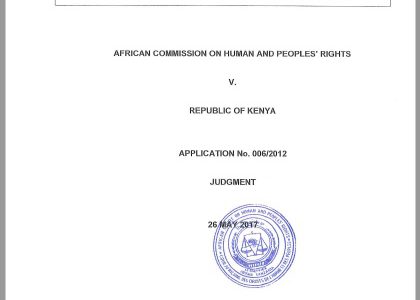On 26 May 2017 the African Court rendered judgement in the case of African Commission on Human and Peoples’ Rights v. Kenya (Judgement). As background, this case involves a claim by the Ogiek people, an indigenous group who have called the Mau Forest in Kenya home for time immemorial. In October 2009, the Kenyan government served an eviction notice on the Ogiek people, requiring them to leave the Mau Forest within 30 days. Represented by the Ogiek Peoples’ Development Program (OPDP) and Minority Rights Group, the Ogiek people brought a case before the African Commission on Human and Peoples’ Rights, arguing that this eviction, and their decades-long treatment at the hands of the Kenyan Government was in violation of various African Charter rights. I have written about the case before here and conducted an in-depth roundtable in December 2016 with Lucy Claridge, then Head of Legal at Minority Rights Group and Daniel Kobei Executive Director of the Ogiek Peoples’ Development Program, a Kenyan-based NGO, Vice-Chairman of the Hunter-Gatherers Forum (HUGAFO) and Secretary of the Ogiek Council of Elders which you can find here.
There can be little doubt that this judgement will go down as one of the African Court’s landmark cases. In a resounding success, the African Court found in the Ogiek peoples’ favour, finding that Kenya’s actions violated Articles 1, 2, 8, 14, 17 (2), 17 (3), 21 and 22 of the African Charter. On 26 May 2018, the Ogiek people will celebrate this landmark judgement.
I am delighted that we can now catch up with Daniel Kobei one the eve of the Judgement’s one year anniversary celebrations to see what has occured in the past 12 months.
OW: Firstly, congratulations again on your success at the African Court. Going back to 26 May 2017 how did the Ogiek community think the judgement may change their circumstances?
DK: Thank you!
The community had waited for too long for justice to be served. Eight years is a long time. For a child who was born in 2009, she or he would be in Class Two in the Kenyan education system. That is a huge development and for the Ogiek,the ruling marked the beginning of a new era. They wanted their rights to be recognised to start enjoying life just like any other ethnic community in Kenya. The African Court did recognize the Ogiek as an indigenous population that is part of the Kenyan people, having a particular status and deserving special protection deriving from their vulnerability.
They had suffered for too long and the African Court’s decision would not only give them cognizance with the government of Kenya, but also trigger it to correct the wrongs they committed against the community. Ejecting them from their ancestral land being a major one, and so the community expected to be settled back to their homes to continue with their normal lives.
OW: Can you provide an update on what has happened since the judgement was rendered?
DK: The community made submissions for reparations in October last year to the African Court through the African Commission. We are awaiting for the African Court’s decision on that
In November last year, the Kenyan government constituted a 6-month term taskforce of 17 members to oversee the implementation of the case. However, it is yet to yield a interim or final report on implementation of the decision for submission to the African Court as mandated in the gazette notice of Nov.10, 2017.
Its tasks include studying the African Court’s decision and other judgements issued by the local courts in relation to the Ogiek’s occupation of the Mau Forest, together with land related laws and policies to see how they address the plight of the Ogiek in the Mau as well as examine the effect of the judgement on other similar cases in other areas of the country.
It must also help establish the registration and ground status of the claimed land and recommend measures to provide redress to the Ogiek’s claim which would include restitution to the original land or compensation with the case or alternative land.
Also,the Kenyan government through the Solicitor General responded to the community’s submission of reparations, and although it was in acceptance of the African Court’s decision,they discounted some of the reparation requests made and outlined unfriendly pre-requisites for implementation of the decision such as exclusion of intermediary parties mainly referring to OPDP and MRG in the implementation process.
The Kenyan government wants to directly engage with the community and we strongly oppose that proposition. In fact, the community wants us to represent their voice in the process. They trust in us and know that what we are doing is for their own good. There is also mushrooming of fake title deeds even before the real implementation begins.
OW: Has the relationship between the Kenyan Government and the Ogiek peoples’ changed since the African Court’s judgement and if so, how?
DK: It is a mixed kind of relationship. While on one hand we have seen good things come out of it, on the other hand, the community is still in pain from continued abuse of the same rights they went to the African Court to reclaim.
This year, we had one of our own (Victor Prengei) nominated to the Senate to represent the youth. This is the first ever high ranking legislative position to be held by an Ogiek. Again, an Ogiek woman was nominated to the County Assembly of Nakuru, a regional legislative arm in Kenya. An Ogiek too was appointed to the position of assistant chief for Ndungulu location in Uasin Gishu County in the Rift Valley region.
Nevertheless, the Ogiek are still being pushed out of their lands by people owning fake title deeds. This is really worrying and that’s why we want the government to speed up the process of actualizing the ruling of the African Court.
OW: The case was only the second involving a transfer from the African Commission to the African Court. How has the relationship between you and the African Commission developed over the past twelve months?
DK: Our relationship has been cordial and throughout,we have maintained constant communication. The Commission passes to us what has been communicated from the African Court and equally delivers our communication accordingly.We do not communicate directly to the African Court but through the African Commission.

